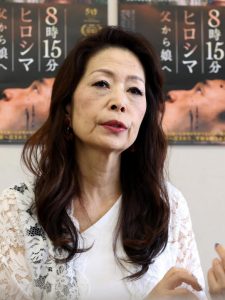Akiko Mikamo, 60, writer of film that shows her father’s experience of atomic bombing, distributes film free of charge
Aug. 7, 2022
by Fumiyasu Miyano, Staff Writer
What Akiko Mikamo wanted to convey was her father’s spirit of forgiveness. Her father Shinji Mikamo, who experienced the Hiroshima atomic bombing, often said he did not hold a grudge against the pilots who dropped the atomic bomb. Mr. Mikamo died in 2020 at the age of 94. On August 6, the anniversary of the atomic bombing on Hiroshima, a documentary film based on his experience was distributed free of charge to the entire world via the Internet. “The world is now in a situation where nuclear war could break out. I want people to learn about the horrors of the atomic bombing and reflect on how to resolve conflicts peacefully,” Ms. Mikamo said.
“8:15 Hiroshima: From Father to Daughter,” a film completed in 2020, was shot by an American director based on Ms. Mikamo’s book. The film spends 51 minutes, more than half of its running time, to vividly depict the horrors of that day as she heard them from her father. The film shows how Mr. Mikamo experienced the atomic bombing in Kamiyanagi-cho (now part of Naka Ward), about 1.2 kilometers from the hypocenter, and wandered under the mushroom cloud seeking help for several days. He wished young people would realize what war was like.
Ms. Mikamo was born and raised in Higashi Ward of Hiroshima. After graduating from Hiroshima University, she went to the United States to study psychology. When she was studying at INSEAD, a French graduate business school in 2010, she talked about her father’s experience of the atomic bombing in a class. Her classmates said in tears, “I’ve never heard such a story.” This caused her to write a book. She wrote 180 pages in four days. The book was published in English in 2013, and has been translated into five languages, including Japanese and German.
Toward the end, the film tells a true story about a pocket watch. It was a memento of Ms. Mikamo’s grandfather, who was killed in the atomic bombing. But the pocket watch was stolen while it was lent to the United Nations through the Hiroshima Peace Memorial Museum. Ms. Mikamo said, “My father was not angry at all. He said that if you get rid of resentment from your heart, you can overcome tragedy and live with a positive attitude.” In his reaction, she saw a key to resolving tensions in a world where people threat others with nuclear weapons.
Ms. Mikamo lives in San Diego, California, and works as a clinical psychologist.
(Originally published on August 7, 2022)
What Akiko Mikamo wanted to convey was her father’s spirit of forgiveness. Her father Shinji Mikamo, who experienced the Hiroshima atomic bombing, often said he did not hold a grudge against the pilots who dropped the atomic bomb. Mr. Mikamo died in 2020 at the age of 94. On August 6, the anniversary of the atomic bombing on Hiroshima, a documentary film based on his experience was distributed free of charge to the entire world via the Internet. “The world is now in a situation where nuclear war could break out. I want people to learn about the horrors of the atomic bombing and reflect on how to resolve conflicts peacefully,” Ms. Mikamo said.
“8:15 Hiroshima: From Father to Daughter,” a film completed in 2020, was shot by an American director based on Ms. Mikamo’s book. The film spends 51 minutes, more than half of its running time, to vividly depict the horrors of that day as she heard them from her father. The film shows how Mr. Mikamo experienced the atomic bombing in Kamiyanagi-cho (now part of Naka Ward), about 1.2 kilometers from the hypocenter, and wandered under the mushroom cloud seeking help for several days. He wished young people would realize what war was like.
Ms. Mikamo was born and raised in Higashi Ward of Hiroshima. After graduating from Hiroshima University, she went to the United States to study psychology. When she was studying at INSEAD, a French graduate business school in 2010, she talked about her father’s experience of the atomic bombing in a class. Her classmates said in tears, “I’ve never heard such a story.” This caused her to write a book. She wrote 180 pages in four days. The book was published in English in 2013, and has been translated into five languages, including Japanese and German.
Toward the end, the film tells a true story about a pocket watch. It was a memento of Ms. Mikamo’s grandfather, who was killed in the atomic bombing. But the pocket watch was stolen while it was lent to the United Nations through the Hiroshima Peace Memorial Museum. Ms. Mikamo said, “My father was not angry at all. He said that if you get rid of resentment from your heart, you can overcome tragedy and live with a positive attitude.” In his reaction, she saw a key to resolving tensions in a world where people threat others with nuclear weapons.
Ms. Mikamo lives in San Diego, California, and works as a clinical psychologist.
(Originally published on August 7, 2022)








